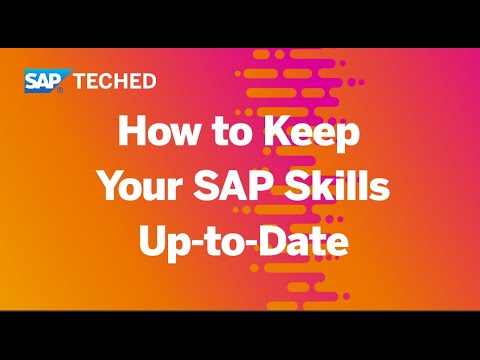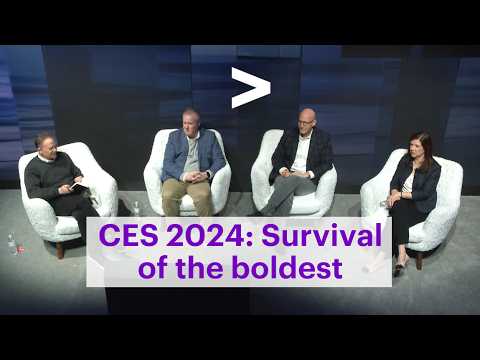Hitting a Moving Target: How to Keep Your SAP Skills Up-to-Date | SAP TechEd in 2020

We have actually the Community. Talk to the community. - Super cool. - I think it is going to be fantastic. and I am really excited to both have Mike and Douglas join us. Hey guys, how are you? - Hello! Hey Craig, how are you doing? - I'm doing great. - Hello Craig! Hello Beth! - Hi! - Hey Douglas again! Very cool. How is everything going for you guys so far? Honestly, Mike, how is the event going on for you all over there in Australia? It has been really good so far.
Particularly enjoyed the Developer Keynote which was in the afternoon for me. And I do miss the friends that I would normally be catching up with TechEd. But I have to say it is really exciting that so many people can join in.
It is a free event, so we have so many more people taking part. So that is very exciting. Alright. Douglas, what about you? How is everything going for you? Chilling on your sofa, drinking your tea and watching.
I have been in the back channel folks. I have been keeping an eye on things back there. So Douglas, how has it been? Yes, Craig. This is right. I had been chilling on the sofa and watching all the sessions that I could. I really enjoyed the keynote yesterday with Jürgen.
And also I really had the nice opportunity to attend the only session about the HANA Cloud. That was really amazing. Now I am looking forward to a lot of activities today. And this has been an amazing event up to now. Alright. Well, I do not want to keep us from Mike's topic. So Douglas, I am going to turn it over to you.
So you and Mike can have your conversation and learn a lot from each other. Okay? So, Douglas, it is all yours! Take it away. Thanks a lot, Craig and Beth. So, hello everyone, welcome to the session on keeping your SAP skills up to date. Hello and welcome again Mike.
Can you please introduce yourself and tell us how long have you been working in the SAP world? Yes. My name is Mike Doyle. I am based in Sydney, Australia, as Craig said. Actually I have been working in the SAP world for 20 years now.
I started off doing ABAP reports and interfaces which I enjoyed a great deal. And I did a lots of travel. I worked on a few projects around Europe because I was based in London at that time. And then after a few years I started to branch out and I did some work with Enterprise Portal and I did quite a bit of Java Web Dynpro if you remember that. And a little bit of job descripts.
And then when I moved to Australia in 2015 ... So we are actually both expats. We both are living somewhere near. After I moved I managed to move into UI5 and I was starting writing the auditor services that I needed to consume in gateway. So I did that for a while.
And then more recently I have done a couple of projects. I have done a lot more UI5. But I have also used the Cloud Application Program Model, the CAP, and also quite a bit of the cloud platform Workflow as well. This is great because it sounds like you had a lot of different experiences. You did a hard work to keep your skills up to date. So, what do you think, Mike, has been the biggest change in that time? Well, there is only one answer really.
It has two different aspects. And the answer is the cloud. So when I started, everything was on-prem. And the last two projects I have done actually have been all cloud. And so that is one side of the coin. Whereas the other side is the race of change that has been enabled. So when I started work I remember my fellow developers used to have lots of books on their desks.
Everybody had a little mini-library and you had your book about ABAP and maybe a book about SQL or something else. And people keep those books for 5 or 10 years. But what has happened recently is the rate of change is just ramped up and up. So already, the first generation of Cloud Platform, the near environment is already essential deprecated. And I only started working on that about 4 years ago.
So, that rate to change is just really dramatic and it seems to be changing faster and faster. That is hard to keep up with. Yeah, I agree. And I think it is very interesting and also inspiring for everyone.
I can say that, too. I started in the SAP world around 2005. And I agree with your point of view regarding how things have changed. In fact, I think in the first 10 years of my career, technology was changing at a slower pace. I also started with ABAP and then I worked in the trainee workflow and SAP Scriptor Join Us.
But now everything is changing quicker and quicker. So, around 2015 I started exploring SAP UI5 and also SAP Cloud Platform. And I see both technologies have changed a lot for the better. From this time to now.
So, I also have this feeling that everything you know is changing. Database and everything before. So, Mike, given that, how have you managed to keep your skills up to date? Well, I think the first thing to say is that it is all about getting the right project experience. You know, in the agile manifesto they said working code is valued over documentation. And I think that a real project experience has to be valued over training courses or reading blogs or anything else.
And you never really become competent in anything until you have real problems to solve. That is when you really learn, when the customer says "I want this." And you have to work out how to do that.
And you may choose to focus on one area. And really read up on that area. Maybe that is the thing you think is going to be the next big thing. But then if you do not manage to get that work in that area, then your skills will die because they are not being used. So I would say really: the most important thing is to go broad rather than deep. So that you know a lot about the different services, the different tools out there, what they can do, so you can be alert when a customer says, "I wish I could do this that", that you are aware of what is around.
There is no way you can possibly know all these different areas in great detail with a great deal of confidence. You cannot possibly remember everything you would need to remember. So that is what I am trying to do. I go broad rather than deep. And then when some project work is coming up I see a requirement where this particular new technology is able to solve the problem. Then I try just in time to go really deep then and really learn that particular area just as the project work is coming up. And then really kind of focus on that area.
And actually I found openSAP is really good for that. So we were doing a cloud application program for a model project this year, a CAP project. And it happened that the openSAP course was on just the right time. So we were all very average students of that openSAP course because we were just starting our project.
And actually, even though I have done a CAP project before, the CAP Java Runtime has really changed a lot. So those openSAP courses are fantastic for that when you really need to get into your subject just as you are starting your work. This is a really amazing thought. I also agree with you here. And I have had very similar experiences and facing the problems of keeping up to date in a very similar way.
But I am also a big fan of books as a good starter point. They are, in fact, no substitutes for real-life practical experience as you said. And I agree that we can become competent at something only after having solved real-world problems for the customers. And this is because it is the only way we can learn it from other people's experiences and from the challenges that we only get to face when we are working to build something by ourselves.
And by going broad, as you mentioned it, we can become aware of many possibilities beyond our expertise areas. And it is very important if we want to see the initial opportunities for our companies or even if we want to find a new career path for ourselves. By the way: openSAP is also one of my favourite searches of information to get up to date with new things coming out from SAP. And yeah.
But Mike, now there are mainly established developers who want to move into new areas but they do not know how to take the first step. Do you have any advice to them? I would say you have to get the mindset where you embrace new languages and new technologies. I think it was DJ Adam who was saying we should aspire to be a developer, not a programmer. If we think of a programmer is basically knowing one language and just wanting to continue with that.
In contrast, the developer is somebody who is willing to learn new things, whatever is required to solve the problem essentially. So, you have to embrace that mindset because there are so many things coming along. You cannot possibly just focus on one thing. And more where that requires some other skills that already have. And some other experience that I already have allows me to move into some new things as well. It does not always happen, but it is great when it does.
You have that role where you feel secure because you are using things you know well but also learning at the same time. And learning a second language, as many peers will know, is a lot easier than learning the first. And once you have learned one, it is easier to learn a second and a third.
As you would know, it is the same with spoken languages. I am not much of a linguist. A few languages I know, Douglas. But it is much the same with the spoken language. If you speak one, it is easy to learn another.
And the other thing to remember really for confidence is to remember that the key qualities of a developer are not really specific to the language or tool that you are used to using, where you have the most experience. They are more general than that. So I am thinking of things like perseverance. If you are deep bugging and trying to solve a particular problem, you need to have a lot of perseverance, but sometimes you need to step away. Maybe you have a good night sleep and the next morning you solve the problem in 10 minutes. And other things like testing.
You know, you have to be rigirous to testing. Never say anything is done until you have tested it and you are sure that it does. And also thinking of, you know, being out to research. Huge amount of information to learn how to do what you need to do. And that is the whole idea of continuous learning. So what I mean by this is just you should have confidence.
If you have those qualities and say you are an ABAPer and you have a lot of ABAP experience, you have demonstrated all of those qualities. And then if you move into another area, another language, then all of those qualities will help you, and you still will be a good developer even if you are on less familiar ground. Yeah, I think this is a lot of very beautiful ideas that everyone can make use it to improve himself. And also I think when learning something new it is extremely important to have a beginner's mind because in the very beginning we can have a massive feeling of incompetence. If we are not prepared for that, we are going to feel frustrated and maybe even give up on our new effort. I think we are mostly aware that we are making the decision of going through a similar path again of learning something new and we must know why we are doing it.
So, we can ourselves during the hard times. I think also having mentors and teachers can be extremely helpful to make this process easier. I learned it and I still learn a lot from mentors and experts, from SAP Community like Gregor Wolf, Thomas Jung and DJ Adam and many others.
And yes, I think that learning a new language is very similar to learning a new technology or a new programming language because with time that feeling of incompetence will be replaced by a feeling of mastering. If we influence the speed of this process by using the occasional focus like you said. So, Mike, do you have any other tips to learning? Well, I think the most important thing really when you are reading blogs, for example, you want to be filtered by quality because time is limited. I am sure everybody's time is limited. And there is so much content out there, it can easily be overwhelming.
And if I am going to read 20% of all the blogs out there or 10% or whatever it is, I want to be the best 10% ideally. And I found Twitter is actually a really good filter for that. So if you follow the right people on Twitter and where there is good content, somebody writes a good blog, you are going to hear about it because people will share it.
And that is a good way to find out where the good content is so that you are really focusing down there. The other thing is rather than just consuming blogs or reading the documentation, if you actually write blogs yourself, than that is actually a really good way to learn. That is something that Graham Robinson said, a mentor down here in Australia. That is something that he says. When he sits down and writes a blog, you cannot help but actually learn new things as you are trying to explain the subject.
You cannot explain something you do not understand fully. That is a really good thing to do. And you have to remember as well: when you write a blog as a developer, you are actually ... you have an insight the SAP. People cannot match because you are actually solving the customer's problems. It is a different thing. So you are using the tools to solve the problem.
So that insight is actually important. And that will really help your fellow developers as well. In the same way actually that writing blogs is a great way to learn, giving talks is also fantastic. Again, you have to master the topic, you have to think about what questions you might get asked and how you are going to respond to that. You have given a few talks as well, haven't you, Douglas? Yes, I totally agree with the idea that genuine or what you know or you want to know will help to learn more about that area.
Yes, I have given talks about SAP S/4HANA, about my journey from being an ABAP developer and learning SAPUI5. In both cases I have to work that you have learned a lot of new details so I could give a better explanation to other people. So, Mike, what do you think are the up-and-coming technologies that we should all be trying to get into? Well, it is a very difficult question. And I am not even going to answer. I am just going to say: I do not really know. This is the honest answer.
I will just carry on trying to read really broadly the TechEd deeply with lots of different sessions. Just so I know what is going on and then I will just look at the project work where we may be able to use one of those new tools or technologies to solve the problem. Yeah.
And I think that in the SAP world we must always be looking for what SAP is offering, but also what customers are willing to buy and implements because companies adopt innovations at different pace. And when we see some companies choosing to use any given new technology, we can many times believe that others will follow probably. So, Mike, do you have any closing words and suggestions for people who are watching us? I just say: get involved in your local SAP Community and in your local community. Since I moved here, I found it really fantastic to get involved with the inside track events and the organizer Stammtisch in Sydney. So it is great and it helps you to find out about the interesting project work where you might be able to do something new.
Yeah, I think these are amazing words, Mike, thanks. So, thanks a lot, Mike, for this amazing interview. I think it was really nice. And Craig and Beth, now back to you in the studio.
Alright, thank you both so much and enjoy the rest of the show. Thank you guys. Thank you. Thank you for having me.
Thank you.
2021-02-26 07:13


